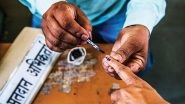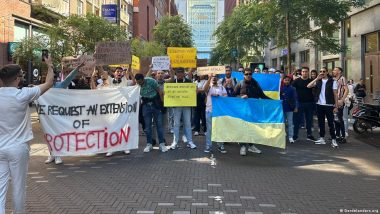When Russia invaded Ukraine, the Netherlands granted temporary refugee status to everyone fleeing the violence, regardless of nationality. But now thousands of people are unsure about their futures.When Mariam Adeshoga arrived in Kyiv in 2019, she could see a future she said would not be possible for a woman computer programmer back in her native Nigeria. The 30-year-old had received a student visa to pursue her master's degree and immediately felt at home.
Also Read | UK Government in Advanced Talks Over USD 500 Million Tata Steel Aid Package.
"When I got there, I got fascinated with people, and the environment was calm and lovely," Adeshoga recounted with a smile. "So, I was like, okay, I could just start my whole life and continue with my future there."
She lived with Ukrainian students, studied the language and culture and worked toward her dreams of inspiring other young women to enter the programming field. Her personal photographs show a beaming Adeshoga with friends at the beach, in a cafe, clowning for the camera in the streets of Kyiv.
"I never planned to leave Ukraine," she told DW. "Ukraine felt so safe to me."
But then, in her words, "everything vanished" when Russia launched its war against Ukraine on February 24, 2022. Like her Ukrainian counterparts, Adeshoga ran for cover in bomb shelters. After a few days of non-stop fear, she sought safety across the border in Poland. Then she went on to the Netherlands, ending up in Amsterdam, housed in a floating hotel in a tiny cabin intended for short-term accommodation.
Adeshoga arrived on March 2, 2022, coincidentally, the same day the European Union decided to activate its 2001 Temporary Protection Directive (TPD) for the first time to quickly assist those escaping the war in Ukraine without forcing them to go through an asylum application process. The Dutch government chose the most liberal application of the directive, welcoming everyone who left Ukraine without regard to their countries of origin.
Adeshoga and the other third-country nationals who fled received the same assistance package as most citizens and permanent residents of Ukraine, including housing, medical care, a living allowance and access to education. That is, until now.
The starting over is over
The government has ordered that the remaining roughly 3,000 people who do not have a permanent right to live in Ukraine must also leave the Netherlands, ending all rights and benefits, by September 4. This directive was supposed to become effective on March 4 but was extended for six months.
In its decision, the country's Immigration and Naturalisation Service (IND), part of the Dutch Ministry of Justice and Security, said the system of third-country nationals coming to the Netherlands under the TPD was being "abused."
"It is extremely important for us to provide protection to people who are not safe in their own country," Minister for Migration Eric van der Berg said. "At the same time, we do not want to overburden municipalities."
The Justice Ministry turned down multiple requests by DW to interview van der Berg about the decision.
One of those affected, who preferred to stay anonymous, shared the letter he received from the mayor of Haarlem demanding he leave his state-sponsored accommodation by midnight on September 4.
"[I]f you do not leave the shelter on time, the municipality make take steps to enforce your departure … [and] hold you liable for the costs of doing so," the letter reads. "If you are not lawfully resident in the Netherlands, you must leave the country and will no longer be permitted to work here." It notes that if the recipient does not leave the Netherlands voluntarily, the government "can organize your forced departure."
The Dutch government has offered €5,000 to the affected third-country nationals to leave of their own accord, with the only other option being to apply for asylum in a system that's already strained. Then, they would need to make the case that their lives would be at risk if they were returned to their home countries — a burden on the system the Temporary Protection Mechanism was explicitly created to avoid.
'Recipe for chaos'
"I wouldn't say that is a proportional way to deal with this," says immigration attorney Lotte van Diepen with the Everaerts law firm in Amsterdam. "I would say it's a recipe for chaos."
Van Diepen represents some third-country nationals, including Mariam Adeshoga, in lawsuits appealing for the right to remain. She believes those people initially covered by the directive continue to have the legal right to stay if they haven't violated Dutch law or other stipulations in the mechanism.
One of Van Diepen's arguments is that since the European Council, comprised of the heads of state and government of EU countries, activated the Temporary Protection Directive, removing those rights must also be a decision made by the Council.
"It's not the authority of the minister to decide when it ends. There are provisions in the directive that stipulate in which scenarios the temporary protection can end, and those scenarios are not applicable, at least not in my cases," she explained.
"My clients are either working or studying. They started building a life here under the presumption that they were allowed to stay here for as long as the Temporary Protection Directive would be applied."
Protests and petitions
Some of those affected have set up a group called Derdelanders ("third-country nationals" in Dutch), organizing demonstrations, starting an online petition and an appeal to the government to reevaluate its decision.
"Our previous status in Ukraine, whether for work or study, should not diminish the adversities we encountered due to the war nor undermine the magnitude of our sufferings," the open letter states. "The criteria for protection should be grounded in humanity and not the technicalities of one's paperwork, passport or background."
Dutch courts are currently considering whether the government had the right to make this decision, but the final ruling won't come before the September 4 deadline.
For Mariam Adeshoga, she received a decision on Friday allowing her to stay in the country and work, at least temporarily, as she awaits expected government appeals, van Diepen told DW. Whatever her fate becomes, she says she's just trying to stay focused on the dream that one day she can unpack for good, inspiring more women to become computer programmers in whatever country ends up being home.
Edited by: Davis Van Opdorp
(The above story first appeared on LatestLY on Sep 03, 2023 07:40 PM IST. For more news and updates on politics, world, sports, entertainment and lifestyle, log on to our website latestly.com).













 Quickly
Quickly


